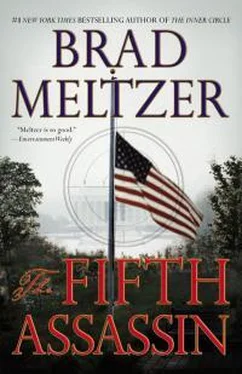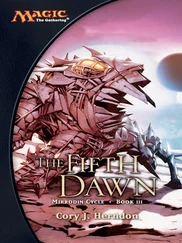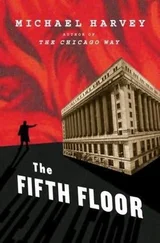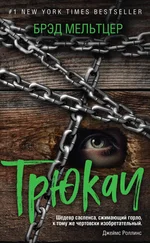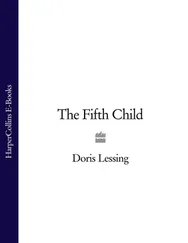“It doesn’t matter where I was born,” Nico growls. “It’s the Knight’s turn now. He knew all that I’d done. But to see what he’s shown me… With the maps alone… I only had the tip of it.”
“I’m confused,” Clementine jumps in. “If it’s the Knight who’s doing this—Is his mission different from yours?”
“Now you’re seeing it, aren’t you? Now you know why he can’t be stopped. Mine was a selfish mission—everything for my own purpose. But what the Knight is doing here—Did you see his first slain? To let Pastor Riis be the first lamb…”
My heart clenches as he says the name of our old pastor in Wisconsin. Marshall told me he was looking into Riis’s death. But back when we were little, I remember that night in the pastor’s basement. Within weeks, Riis was run out of town. And Marshall’s mother put a gun in her mouth and pulled the trigger.
“Nico, if you know that Marshall’s doing this…”
Nico wraps up his homemade map, stuffing it back into his pocket.
“If you’re protecting Marshall, or covering for him,” I add.
“I told you, Benjamin, I’ve never seen the Knight before. He knows better than to come in person. But I do know this: In the case of Pastor Riis, the Knight understands the value of doing for others. And proving one’s loyalty.”
“Loyalty to who?”
Without a word, Nico lowers his chin and drills me with a dark glare.
From behind us, a determined wind shoves against my back. “You asked the Knight to kill Pastor Riis, didn’t you? You pointed him to the first victim.”
Staying silent, Nico stares straight at me. “In my experience, Benjamin, you can’t make a man do what he doesn’t already want to.”
As I turn away, my brain tries to fill in the rest. Riis was practice. Then when the copycat murders started… first the rector from St. John’s… then Pastor Frick from Foundry Church. Both of them spent time with the President—but both also studied under Riis. For it all to be tied together… “Nico, is that how the Knight found his other victims? What started with Riis then led to—”
“You keep focusing on the lambs. But look at their locations too: Look at the temples—look what he’s working toward. His is an act of God.”
“Why? Because he thinks he’s protecting the church?”
“You keep saying that. You keep insisting that in the playing cards, they’re protecting the church. But you’re forgetting the real mission of Vignolles and his sacred Knights. From the start, the Knights weren’t just protecting the church. They were protecting the church’s greatest secret .”
“And what secret is that?”
Nico tilts his head, looking at me like I’m still arguing that the world is flat. “Isn’t it obvious, Benjamin? They protect the real Name of God.”
76
In the beginning, the Knight had doubts too. How could he not?
Even now, as he walked slowly down the hospital hallway, toward the chapel at the far end, he thought back to those moments when he first heard the story, about the true Name of God. There was no arguing with what really happened. Or that it happened over and over throughout history.
For Jews, the true Name of God was said only once each year, by the high priest in the Temple. To protect it, the Hebrews used YHWH —the four consonants of the Hebrew name for God —saying that the vowels should be hidden and the real Name should never be pronounced. To protect it even further, they later replaced it with Adonai , which meant Lord . In the Christian Bible, God gave Jesus the “Name above all Names,” which began as The Anointed One , then The Christ , then Jesus Christ , then Lord and YHWH . And in the Muslim religion, where God is known as Allah , God is said to have ninety-nine names, and that those who know all of God’s Names will enter Paradise.
Indeed, the issue remained such a potent one throughout history that as recently as 2008, the Vatican issued a directive that said, when it came to the Name of God, the name Yahweh could no longer be “used or pronounced” in any songs or prayers.
It was this essential question that the Knight could not let go of: What power could the Name of God really hold that all three religions still treat it with such reverence, even to this day?
Over the centuries, dozens of theories developed. Ancient healers supposedly used God’s real Name to cure the sick. Early grimoires said that the Name of God unlocked untold power. And exorcists and mystics insisted that those who controlled the Name of God could control God Himself.
Even the Knight knew that was crazy. Just as his predecessor in the fifteenth century—Étienne de Vignolles… the Chosen Knight… the Sacred Knight—knew that the true Name of God had nothing to do with magic powers or mystical exaggerations.
Still, century after century, religion after religion, there were always those who sought power by claiming to know God’s real Name. But as Vignolles found out when he was trusted by both church and king, great power didn’t come from knowing the Name of God.
Great power came from hiding it.
Over the course of centuries, so many religious answers have been lost. But as for the true Name of God, those answers were purposely hidden.
For thousands of years, so much good has been done in the Name of God. But also, the First Knight was asked, how much harm has been done—by Christians, by Jews, by Muslims alike—because of their assumption of exclusiveness? How many throats have been slit? How many innocents slaughtered? Religions have built empires, launched crusades, and fought some of the world’s bloodiest wars based on the differences in how they viewed God.
But what if there was no difference? How would the followers of Jesus, or Allah, or Adonai react if the real secret of secrets—the greatest secret of all—was simply this: that for every religion, the true Name of God was exactly the same ? Forget Christian God, Muslim God, or Hebrew God. Think of the power that would be lost if there were just…
One God.
Vignolles was shaken too when he first heard the story. He didn’t want to believe it. No one would believe it. But to hear the rumblings from the king’s court… from someone so respected… how could it be ignored? Unsure of what to do, Vignolles did the only thing he always did before a battle.
He prayed.
In no time, he had his answer. The story of One God was a blasphemy—a lie!—and if the king were to ever bring it to light…
Luckily, Vignolles didn’t have to pull his sword. King Charles VII never reached the heights of power that would let him challenge the church.
Still, Vignolles knew this was a problem that would rise again. When it did, a new Knight would be needed. From there, the secret army took shape. Preparations were made. Instructions written. And the symbols—of hearts, spades, diamonds, and clubs—were incorporated into the one place no one would ever think to notice.
For centuries, Vignolles’s playing cards would carry his warning of how the king could destroy the church. And for centuries, the chosen Knights would lie in wait, taking on chancellors, emperors, monarchs, tsars, and anyone else whose growing influence and claim of unity might interfere with the primacy of church power. Including, even, a President.
Six centuries later, the current Knight—the Knight of the fifth and final symbol—reached the end of the hospital’s long hallway and approached the Interfaith Chapel. A place that treated every religion the same. How perfect.
The plaster Abraham Lincoln mask was hidden inside his jacket. So was his Iver Johnson revolver. Behind him, the slowed-down version of “Little Red Corvette” still echoed on the piano.
Читать дальше
